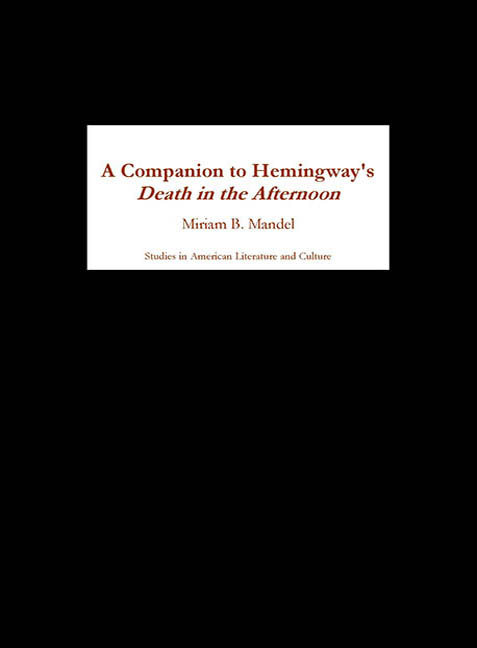Book contents
- Frontmatter
- Dedication
- Contents
- Acknowledgments
- Hemingway Works That Address the Bullfight
- A Note on the Text of Death in the Afternoon
- Introduction
- Composition, Sources, and Backgrounds
- Reading Texts, Paratexts, and Absence
- On Authorship and Art
- And What Came After
- Works Cited
- Notes on the Contributors
- Index
Introduction
Published online by Cambridge University Press: 27 April 2017
- Frontmatter
- Dedication
- Contents
- Acknowledgments
- Hemingway Works That Address the Bullfight
- A Note on the Text of Death in the Afternoon
- Introduction
- Composition, Sources, and Backgrounds
- Reading Texts, Paratexts, and Absence
- On Authorship and Art
- And What Came After
- Works Cited
- Notes on the Contributors
- Index
Summary
Hemingway's nonfiction continues to be the most neglected part of his canon.
Michael S. ReynoldsIt has been said, both in praise and as criticism, that anyone can read the work of Ernest Hemingway — and indeed, one does not need a graduate degree in literary theory or cultural studies or cross-cultural studies or philosophy or semiotics or history to enjoy his books. Still, the scholars who have been trained in these various disciplines can help us identify and explore complexities that, like the trout that lurk in Hemingway's fictional waters, are not readily visible. This is the function of criticism: to open up the text, to reveal the questions it raises, to suggest answers, to enrich our reading, to raise the prize fish so that it is visible and ours.
Over the years, a growing number of casebooks and companions have helped professional readers — teachers, scholars, critics, researchers — explore Hemingway's fiction. At last count, there were five such collections on The Sun Also Rises, another five on A Farewell to Arms, a lesser number on For Whom the Bell Tolls and To Have and Have Not, and a few on his collections of short stories and even on his “neglected short fiction.” But no such collections or companions are available to students of his nonfiction, which includes at least seven books: two volumes of journalism (Dateline: Toronto and By-Line: Ernest Hemingway), two African books (Green Hills of Africa and True at First Light), two Spanish books (Death in the Afternoon and The Dangerous Summer), and a memoir of his Paris years (A Moveable Feast). This Companion to Hemingway's “Death in the Afternoon” is a groundbreaking publication, in that it is the first such book to focus on a volume of Hemingway's nonfiction.
Death in the Afternoon is the right book to launch what should become an avalanche of casebooks on the nonfiction. It is his longest book and the one that took him longest to produce: nine years of travel, research, writing, and revising passed between his first essay on the bullfight in 1923 and the book's publication in 1932. And it is a notoriously difficult book: not difficult to read, but almost impossible to define. It looks like a nonfiction essay on bullfighting, but it strays away from that subject to offer travel literature, biography, lexicography, literary theory, and philosophy.
- Type
- Chapter
- Information
- A Companion to Hemingway's Death in the Afternoon , pp. 1 - 18Publisher: Boydell & BrewerPrint publication year: 2004



